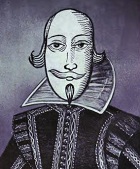Cymbeline
Please see the bottom of the page for explanatory notes.
| ACT V SCENE II | A Field of battle between the British and Roman camps. | |
| | Enter, from one side, LUCIUS, IACHIMO, and the Roman Army: from the other side, the British Army; POSTHUMUS LEONATUS following, like a poor soldier. They march over and go out. Then enter again, in skirmish, IACHIMO and POSTHUMUS LEONATUS he vanquisheth and disarmeth IACHIMO and then leaves him. | |
| IACHIMO | The heaviness and guilt within my bosom | |
| | Takes off my manhood: I have belied a lady, | |
| | The princess of this country, and the air on't | |
| | Revengingly enfeebles me; or could this carl, |
| | A very drudge of nature's, have subdued me | |
| | In my profession? Knighthoods and honours, borne | |
| | As I wear mine, are titles but of scorn. | |
| | If that thy gentry, Britain, go before | |
| | This lout as he exceeds our lords, the odds |
| | Is that we scarce are men and you are gods. | 10 |
| | [ Exit. | |
| | The battle continues; the Britons fly ; CYMBELINE is taken: then enter, to his rescue, BELARIUS, GUIDERIUS, and ARVIRAGUS. | |
| BELARIUS | Stand, stand! We have the advantage of the ground; | |
| | The lane is guarded: nothing routs us but | |
| | The villany of our fears. | |
| GUIDERIUS | | |
| | | Stand, stand, and fight! | |
| ARVIRAGUS | | | |
| | Re-enter POSTHUMUS, and seconds the Britons: they rescue CYMBELINE, and exeunt. Then re-enter LUCIUS, and IACHIMO, with IMOGEN. | |
| CAIUS LUCIUS | Away, boy, from the troops, and save thyself; | |
| | For friends kill friends, and the disorder's such | |
| | As war were hoodwink'd. | 20 |
| IACHIMO | 'Tis their fresh supplies. | |
| CAIUS LUCIUS | It is a day turn'd strangely: or betimes | |
| | Let's reinforce, or fly. | |
| | [ Exeunt. | |
Cymbeline, Act 5, Scene 3
_______
Explanatory Notes for Act 5, Scene 2
From Cymbeline. A.W. Verity. Cambridge, University Press.
______
4. carl, churl, peasant.
16. hoodwink'd, blind-folded.
18. re-inforce; perhaps 'renew the attack.'
How to cite the explanatory notes:
Shakespeare, William. Cymbeline. Ed. A.W. Verity. Cambridge, University Press, 1899. Shakespeare Online. 10 Dec. 2013. < http://www.shakespeare-online.com/plays/cymbel_5_2.html >.
How to cite the sidebar:
Mabillard, Amanda. Notes on Shakespeare. Shakespeare Online. 10 Dec. 2013. < http://www.shakespeare-online.com/plays/cymbel_5_2.html >.
_____
|
More to Explore
 Cymbeline: The Play with Commentary Cymbeline: The Play with Commentary
 Cymbeline Plot Summary Cymbeline Plot Summary
 Famous Quotations from Cymbeline Famous Quotations from Cymbeline
 How to pronounce the names in Cymbeline How to pronounce the names in Cymbeline
 Sources for Cymbeline Sources for Cymbeline
 Introduction to Imogen Introduction to Imogen
 Introduction to Guiderius and Arviragus Introduction to Guiderius and Arviragus
 Introduction to Cloten Introduction to Cloten
 Introduction to Cymbeline Introduction to Cymbeline
 Introduction to Posthumus Introduction to Posthumus
 Introduction to Iachimo Introduction to Iachimo
_____
Notes on Shakespeare...
 Richard Shakespeare, Shakespeare's paternal grandfather, was a farmer in the small village of Snitterfield, located four miles from Stratford. Records show that Richard worked on several different farms which he leased from various landowners. Coincidentally, Richard leased land from Robert Arden, Shakespeare's maternal grandfather. Read on...
Richard Shakespeare, Shakespeare's paternal grandfather, was a farmer in the small village of Snitterfield, located four miles from Stratford. Records show that Richard worked on several different farms which he leased from various landowners. Coincidentally, Richard leased land from Robert Arden, Shakespeare's maternal grandfather. Read on...
____
Shakespeare acquired substantial wealth thanks to his acting and writing abilities, and his shares in London theatres. The going rate was £10 per play at the turn of the sixteenth century. So how much money did Shakespeare make? Read on...
Henry Bolingbroke, the eldest son of John of Gaunt and the grandson of King Edward III, was born on April 3, 1367. Henry usurped the throne from the ineffectual King Richard II in 1399, and thus became King Henry IV, the first of the three kings of the House of Lancaster. Read on...
____
Known to the Elizabethans as ague, Malaria was a common malady spread by the mosquitoes in the marshy Thames. The swampy theatre district of Southwark was always at risk. King James I had it; so too did Shakespeare's friend, Michael Drayton. Read on...
____
Eleanor of Aquitaine was one of the most captivating and complex figures in history. In 1152, Eleanor married Henry Plantagenet (later to become Henry II). Their son, John, was born in 1167 and is the title character of Shakespeare's history play.
|
 Shakespeare's Treatment of Love in the Plays Shakespeare's Treatment of Love in the Plays
 Shakespeare's Dramatic Use of Songs Shakespeare's Dramatic Use of Songs
 Shakespeare Quotations on Love Shakespeare Quotations on Love
 Shakespeare Wedding Readings Shakespeare Wedding Readings
 Shakespeare on Sleep Shakespeare on Sleep
|
 Richard Shakespeare, Shakespeare's paternal grandfather, was a farmer in the small village of Snitterfield, located four miles from Stratford. Records show that Richard worked on several different farms which he leased from various landowners. Coincidentally, Richard leased land from Robert Arden, Shakespeare's maternal grandfather.
Richard Shakespeare, Shakespeare's paternal grandfather, was a farmer in the small village of Snitterfield, located four miles from Stratford. Records show that Richard worked on several different farms which he leased from various landowners. Coincidentally, Richard leased land from Robert Arden, Shakespeare's maternal grandfather.